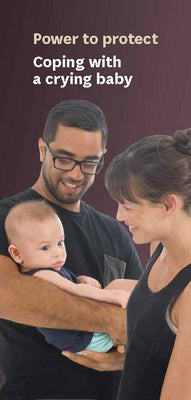Power to Protect: Coping with a crying baby - HE2460

This resource for health professionals to use with parents and caregivers talks about the reasons why a baby may cry, gives tips for how to cope, and explains the damage that can be caused by shaking a baby.
Printed copies of this pamphlet are limited and restricted to 200 copies per order (by health professionals). However, everyone can read the information online and download a PDF copy.
Some of the information in this pamphlet is also contained in the Well Child Tamariki Ora My Health Book.
The full resource:
Caring for a baby can be challenging at times.
Although you will have lots of great moments, you may also have some worries about what is best for your baby. One of the hardest times can be when baby cries, and you can’t work out why. This can be very frustrating.
The six key messages
-
The call of the future: it is normal for babies to cry and it is the sound of our future.
Crying does not mean your baby is naughty. Check for a cause (see the crying checklist on page 5), but you may not find a cause for the crying. This can be very frustrating. -
Walk away till you’re OK.
If you are becoming frustrated, put baby in a safe place (e.g. wahakura, pepipod, or bassinette), leave the room and close the door. Do something that helps you to de-stress and centre yourself. Check on baby, but only pick baby up when you’re calm. -
Protect your whakapapa.
Through protection of newborns, whānau safeguard their unique identity, protecting the fabric of cultural diversity and resilience.
Never ever shake a baby. -
Grow your baby’s tribe.
Only entrust your baby to reliable caregivers who will ensure a nurturing environment. -
Share this information with all who look after your baby.
It takes a village to raise a child. -
Awhi tautoko. Never be afraid to reach out.
Call someone important to you. Family, friends, support groups and online resources can help. If you think baby may have been injured, call emergency help (111) at once.
“After a few minutes away, I feel 100% better. I am calmer and happy to comfort her.”
Father of three-month-old baby
Getting help
Friends and family members
Your midwife, GP or Well Child provider
If you’d like someone to talk to, call:
Plunketline 0800 933 922
Healthline 0800 611 116
Lifeline 0800 543 354
Parenting Helpline 0800 568 856
Youthline for young parents 0800 376 633
Youthline Free TXT 243
Why not take some time now to list the names and numbers of close friends and relatives you can call.
If you think your baby has been shaken, get help straight away. Don’t let fear or pride stop you. It could save your baby’s life.
Phone 111 for urgent medical help.
Crying checklist
- Cuddle your baby
- Try offering a feed again
- Change the nappy if it is wet or dirty
- Make sure your baby’s clothing is not too tight
- Make sure your baby isn’t too hot or cold
- Burp your baby (wind pain can be very uncomfortable)
- Wrap and hold baby safely in a lightweight blanket
- Is baby tired? Put baby down somewhere safe to sleep.
I’ve done all this and baby’s still crying… now what?
- Hold your baby close, massage their back, sing, hum or talk
- Give baby a warm soothing bath or take one together. Never leave baby unattended in the bath.
- Put baby in a stroller and go for a walk or in a car seat for a short drive.
If you are worried baby is unwell, contact your midwife, GP or Well Child provider.
For more advice or help, visit:
Never Ever Shake A Baby | KidsHealth
Only leave your baby with people you trust.
Keeping your baby safe
Have a plan of what you will do if your baby keeps crying and you become upset or angry.
If you think you are becoming frustrated or angry, do not pick up baby!
Walk away
If you’re holding baby, put baby in a safe place and walk away. Leave the room.
Take a break
Check baby often, but do not pick baby up until you feel calm.
Try doing something that usually relaxes you, like a quick shower or a cup of tea.
Talk to someone
Call a relative, friend or trusted neighbour to give you a break.
Don’t be embarrassed. It’s OK to know when you’ve reached your limit.
For more advice or help, visit
What Can You Do When Your Baby Cries? | KidsHealth NZ